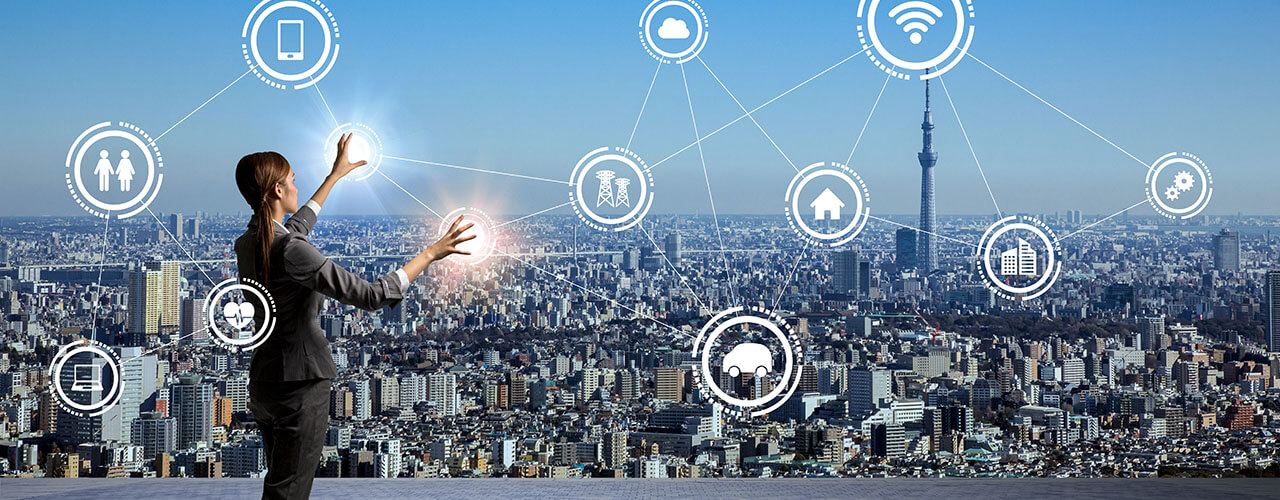The Internet of Things (IoT) is changing the way we carry out many day-to-day tasks. For the world’s flexible office spaces, this wave is breaking through in many areas and bringing vast benefits in its wake.
What is the IoT?
The IoT refers to the billions of physical devices that are now connected to the internet. These devices collect and share data, allowing for in-depth analysis to optimize everything from our healthcare services to shopping experiences.
For the most part, flexible offices are embracing IoT tech to help better manage their spaces. Here are some of the top IoT (aka smart) technologies used in flexible office spaces as well as the benefits they bring:
IoT-optimized energy = environmental benefits + cost savings
The smart home is gaining momentum and many of these household technologies are crossing over into the world of flexible working.
The main benefits of such smart tech are the associated reductions in energy consumption. For example, IoT-based motion sensors can automatically turn the lights on and off, allowing you to regulate the lighting based on movement or alert you if a light bulb goes out. You could even try a smart LiFi system – where the LED lights in your workplace are transformed into a wireless network.
IoT-based tech can also sync your HVAC systems with the weather in real time, or open and close your blinds depending on the weather or the time of day.
Smart HVAC systems can also monitor the air quality in your workspace, keeping it at an optimum level. Used in conjunction with smart meters, these technologies allow you to both maintain a constant temperature (and more pleasant working environment) and also reduce your power consumption rates.
Smart tech can also be integrated into your office equipment, alerting you if, for example, your printers are about to run out of ink. Such predictive maintenance measures help prevent downtime of this equipment, boosting the user experience.
You could even put sensors in your office plants, ensuring they have enough water and fertilizer to thrive.
Smart access + payments = Additional revenue streams
A range of access systems is now available to allow your members to enter and exit your flexible workspace with the swipe of a card, phone, or fingertip. Many popular systems use Bluetooth beacons and keyless entry based on mobile apps to provide a truly seamless user experience.
Not only do such technologies mean you can open your space 24/7, but you can also give members access to specific areas, and prevent them from entering potentially hazardous ones. For example, a member could book a meeting room for a specific time and only get access for their allotted hours.
You could also combine your smart access system with a smart cashless payment system. As a result, members could be automatically charged for meeting room usage, seating usage, food and drinks, using office supplies, or attending events at your space.
Smart cameras = secure spaces
While cutting edge access systems open up your space to the masses, you also need to make sure your space is secure.
Smart business video surveillance systems and security cameras can monitor for unauthorized access and integrated motion detectors which mean they only start recording when someone enters your space. These images or video clips can then be sent straight to your smartphone, allowing you to remotely monitor your space.
IoT everywhere
IoT technology is constantly evolving to meet the changing demands of your workspace’s members. It provides you with a cutting edge method to make your space more accessible, easier to use, cheaper to run, and more environmentally friendly.
The IoT also produces vast amounts of information about your space. By analyzing this data, you can identify popular areas or facilities and optimize your space to give your members what they want, when they want it.
A handful of platforms are becoming available, allowing you to use this powerful combination of Big Data, AI (Artificial Intelligence), and the IoT to conduct this analysis and optimize your workspace in new and innovative ways.
The true impact of the IoT + AI + Big Data on the flexible workspace industry is not yet fully realized. But early adopters could reap unrealized rewards, putting you ahead of the competition.









